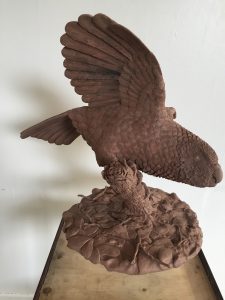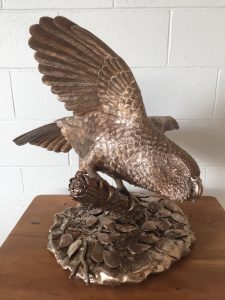We use the ancient lost-wax bronze casting process to produce our most detailed and refined sculptures. This traditional technique allows us to capture intricate textures, fine detail, and complex undercuts—features that would be difficult or impossible to replicate using other methods.
While it is a highly labor-intensive process, the results are truly exceptional and well worth the effort. In fact, for sculptures with intricate design elements, lost-wax casting is often the only method capable of faithfully reproducing the original model in bronze.
For simpler forms, alternative casting methods such as sand casting may offer a faster and more cost-effective solution. However, to achieve the level of quality and precision seen in pieces like this New Zealand Kākāpō, lost-wax casting remains the gold standard.
Below is a brief outline of the key steps involved in creating a sculpture using this method.

-
- Make a sculpture – Materials – Steel Armature – Oil Based Modelling Clay + 6 Months
- Make a rubber mold – Silicone Rubber – FibreGlass
- Cast wax – Microcrystalline Wax – Mixed with another type of Wax – Not – Paraffin wax
- Tidy wax – Sculpting Tools – Heat
- Add Core Pins and Core – Secret
- Sprue and Vent wax – Wax Cup and Rods & Vents made from Original Wax
- Build ceramic shell around wax – Secret Ceramic Shell
- Dry shell – Secret
- Burn out wax – Fast with Heat
- Dry core – Secret
- Preheat ceramic shell – Secret
- Melt and pour bronze – 1150 Celcius
- Remove shell – Hammer
- Sand blast-WearDustMask

- Cut sprues and vents – Recycle Bronze
- Remove core and pins – Fiddly
- Weld holes – Tidy Welds
- Fettle bronze – is the Process of Tidying up any blemishes, welds, holes and to bring the,
- rough Casting back to how the original Sculpture looked once it was finished.
- Colour and seal – Chemical Patenas, Heat Treatments, Guilders Paste etc
- One finished bronze – Beautiful Aye !
Once our bronze item is completed, we then repeat the process all over again. Take a look at our gallery of bronze art made using the same or similar techniques.